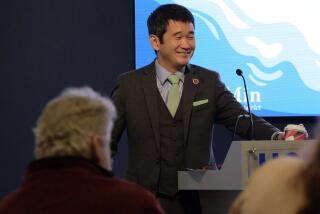Selection of New Bishop May Take Six Months
Even before the funeral of Bishop William R. Johnson, church officials say, speculation has begun about who might assume the leadership of the Diocese of Orange.
Johnson, the first bishop of the half-million-member Catholic diocese, died Monday at the age of 67 after a lengthy illness.
The leading candidate to replace Johnson is the Most Rev. John T. Steinbock, who was appointed auxiliary bishop of the diocese two years ago. But observers say that his elevation is not certain, and that he could be passed over for a Latino cleric or another auxiliary bishop supported by Los Angeles Archbishop Roger M. Mahony.
All candidates are likely to be theological conservatives and Spanish speakers, these observers say. Steinbock fits that category, as did Johnson.
Three Finalists
Johnson’s successor will be named by Pope John Paul II, probably some time in the next six months. However, the real choice is likely to be made by Archbishop Pio Laghi, the apostolic delegate to the United States, who compiles the “terna,” or list of three finalists ranked in order of preference and placed before the Pope in the Vatican.
“I think they will try very hard to find a Hispanic bishop,” said the Rev. Thomas J. Reese, an authority on the selection process, noting the large percentage of Latinos in Orange County, including many undocumented workers. The diocese believes that more than half of its parishioners are Latino.
At the same time, much of the financial support for the church in the county comes from affluent, conservative Anglos.
“It’s going to be an interesting diocese to fill,” said Reese, a native of Southern California who is now associate editor of the Jesuit magazine “America.”
Another imponderable is the role of Los Angeles’ Mahony.
“Mahony would be a key player in the whole process because he is archbishop” and an influential regional leader, Reese said. “Laghi is certainly going to ask Mahony for his recommendation.”
In an article entitled “The Selection of Bishops,” Reese wrote that “from the time Matthias was chosen by lot to replace Judas as one of the Twelve, the process by which bishops are selected has been an important and often controversial issue in the church.”
Since the article was published two years ago, Reese has continued to study the way in which church leaders are chosen.
The procedure is set out in church documents only “in skeletal outline,” Reese wrote, and “even Catholics know little about the process.”
Politics May Intrude
Although church officials deny it and the procedures utilized guard against it, the process sometimes becomes political, observers say.
“No one likes to use that word, ‘political,’ in connection with the church,” Reese said in a telephone interview from Georgetown University in Washington, D.C., where he is writing a book on the selection process. “It’s not a political process, it’s a human process.”
Still, he writes, “when groups ignore canon law and lobby anyway, it’s usually against a particular candidate and not for one.”
Archbishop Laghi, whose office is in Washington, is charged with gathering information about prospective candidates, which entails consulting widely throughout the clerical community.
When he has narrowed the list to eight or 10 leading contenders, Reese says, those names are sent to the National Conference of Catholic Bishops, asking for a list of three names ranked by order of preference, with the reasons for that preference. Ultimately, the decisions of which three names are sent to the Pope and in what order are Laghi’s.
‘Obvious Candidate’
“If a vacant diocese has an auxiliary,” Reese writes, “he is an obvious candidate to become the ordinary, and the pronuncio will hear from people about his qualifications,” Reese wrote.
Thus, speculation in Orange County begins with Steinbock.
Steinbock is considered the early favorite, by virtue of his position and the favorable impression he has made as a man cut from the same compassionate cloth as Bishop Johnson. He is articulate, and in recent months he assumed many of Johnson’s administrative responsibilities. At 49, he is about the right age for such a post.
The only question being asked by some church officials is whether he is up to the administrative task of running the diocese on his own.
“He’s a very nice man, very kind, but they need a little bit more than kindness down there,” said a Los Angeles church official, who, like others interviewed, asked not to be identified by name.
Illness Was Known
Bishop Johnson’s ill health was known at the time of Bishop Steinbock’s appointment two years ago, the official said.
“If they had wanted him to succeed they would have appointed him co-adjutor,” with automatic right of succession, rather than auxiliary bishop, the official said.
If Steinbock is passed over, it is possible he may remain as auxiliary bishop in Orange County, or he may be appointed to head a smaller diocese, church observers said. Services for Johnson will take place tonight and tomorrow.
A Mass for the lay community is scheduled for 7:30 p.m. today at Holy Family Cathedral in Orange, with a viewing before and after the service until 10:30 p.m., when a Vigil service and a Rosary will be held.
At 10 a.m. Friday a Mass for Christian Burial will be held, for clergy and members of religious orders, also at Holy Family. There will no viewing Friday, and the Mass will be followed by interment at Holy Sepulchre Cemetery in Orange.
More to Read
Sign up for Essential California
The most important California stories and recommendations in your inbox every morning.
You may occasionally receive promotional content from the Los Angeles Times.










